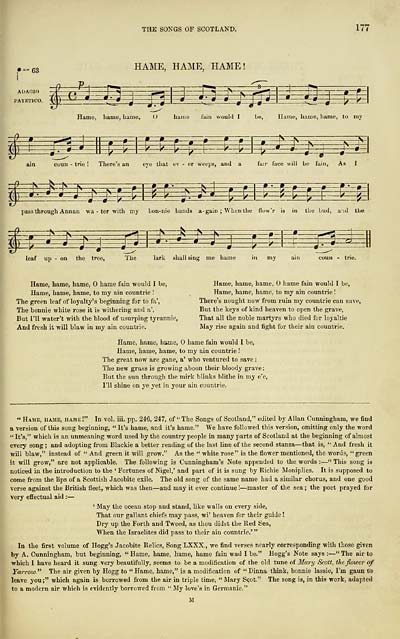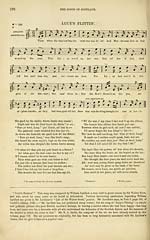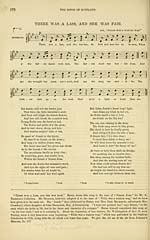Glen Collection of printed music > Printed music > Wood's edition of the songs of Scotland
(201) Page 177 - Hame, hame, hame
Download files
Complete book:
Individual page:
Thumbnail gallery: Grid view | List view

THE SONGS OF SCOTLAND.
177
.• — 63
I
AllAfJIO
l'ATKTICO.
-P-
HAME, HAME, HAME !
w
^5 — V
-0 —
HTJb
^5
-^— — v-
I
Hame, liame, hame, U hame lain would I be, Hame, hame, liame, to my
IeIH^
=*=*=
SE
m
£
£ ;
=£
ain coun - trie ! There's an eye tliat ev - er weeps, and a fair face will be fain, As I
feg^P^fg
i
3
-# — •■
pass through Annan wa - ter with my bon-nie bands a- gain ; When the flow'r is in the bud, a-id the
P
=*=*
Si
IS
-N-— fe- *:
3tZ=f=t
*:
3^
leaf up - on the tree, The lark shall sing me hame in my ain coun - trie.
Hame, hame, hame, hame fain would I be,
Hame, hame, hame, to my ain countrie !
The green leaf of loyalty's beginning for to fa',
The bonnie white rose it is withering and a',
But I'll water't with the blood of usurping tyrannie,
Aud fresh it will blaw in my ain countrie.
Hame, hame, hame, hame fain would I be,
Hame, hame, hame, to my ain countrie !
There's nought now from ruin my countrie can save,
But the keys of kind heaven to open the grave,
That all the noble martyrs who died for loyaltie
May rise again and fight for their ain countrie.
Hame, hame, hame, hame fain would I be,
Hame, hame, hame, to my ain countrie !
The great now are gane, a' who ventured to save ;
The new grass is growing aboon their bloody grave;
But the sun through the mirk blinks blithe in my e'e,
I'll shine on ye yet in your ain countrie.
" Hame, dame, hame !" In vol. iii. pp. 246, 247, of " The Songs of Scotland," edited by Allan Cunningham, we find
a version of this song beginning, " It's hame, and it's hame." We have followed this version, omitting only the word
•' It's," which is an unmeaning word used by the country people in many parts of Scotland at the beginning of almost
every song ; and adopting from Blackie a better reading of the last line of the second stanza — that is, '• And fresh it
will blaw," instead of " And green it will grow." As the " white rose" is the flower mentioned, the words, " green
it will grow," are not applicable. The following is Cunningham's Note appended to the words : — " This song is
noticed in the introduction to the ' Fortunes of Nigel,' and part of it is sung by Richie Moniplies. It is supposed to
come from the lips of a Scottish Jacobite exile. The old song of the same name had a similar chorus, and one good
verse against the British fleet, which was then — and may it ever continue ! — master of the sea ; the poet prayed for
very effectual aid : —
' May the ocean stop and stand, like walls on every side,
That our gallant chiefs may pass, wi' heaven for their guide !
Dry up the Forth and Tweed, as thou didst the Red Sea,
When the Israelites did pass to their ain countrie.' "
In the first volume of Hogg's Jacobite Relics, Song LXXX., we find verses nearly corresponding with those given
by A.Cunningham, but beginning, "Hame, hame, hame, hame fain wad I be." Hogg's Note says: — "The air to
which I have heard it sung very beautifully, seems to be a modification of the old tune of Mary Scott, the flower of
Yarrow," The air given by Hogg to " Hame, hame," is a modification of " Dinna think, bonnie lassie, I'm gaun to
leave you;" which again is borrowed from the air in triple time, " Mary Scot." The song is, in this work, adapted
to a modern air which is evidently borrowed from " My love's in Germanic"
M
177
.• — 63
I
AllAfJIO
l'ATKTICO.
-P-
HAME, HAME, HAME !
w
^5 — V
-0 —
HTJb
^5
-^— — v-
I
Hame, liame, hame, U hame lain would I be, Hame, hame, liame, to my
IeIH^
=*=*=
SE
m
£
£ ;
=£
ain coun - trie ! There's an eye tliat ev - er weeps, and a fair face will be fain, As I
feg^P^fg
i
3
-# — •■
pass through Annan wa - ter with my bon-nie bands a- gain ; When the flow'r is in the bud, a-id the
P
=*=*
Si
IS
-N-— fe- *:
3tZ=f=t
*:
3^
leaf up - on the tree, The lark shall sing me hame in my ain coun - trie.
Hame, hame, hame, hame fain would I be,
Hame, hame, hame, to my ain countrie !
The green leaf of loyalty's beginning for to fa',
The bonnie white rose it is withering and a',
But I'll water't with the blood of usurping tyrannie,
Aud fresh it will blaw in my ain countrie.
Hame, hame, hame, hame fain would I be,
Hame, hame, hame, to my ain countrie !
There's nought now from ruin my countrie can save,
But the keys of kind heaven to open the grave,
That all the noble martyrs who died for loyaltie
May rise again and fight for their ain countrie.
Hame, hame, hame, hame fain would I be,
Hame, hame, hame, to my ain countrie !
The great now are gane, a' who ventured to save ;
The new grass is growing aboon their bloody grave;
But the sun through the mirk blinks blithe in my e'e,
I'll shine on ye yet in your ain countrie.
" Hame, dame, hame !" In vol. iii. pp. 246, 247, of " The Songs of Scotland," edited by Allan Cunningham, we find
a version of this song beginning, " It's hame, and it's hame." We have followed this version, omitting only the word
•' It's," which is an unmeaning word used by the country people in many parts of Scotland at the beginning of almost
every song ; and adopting from Blackie a better reading of the last line of the second stanza — that is, '• And fresh it
will blaw," instead of " And green it will grow." As the " white rose" is the flower mentioned, the words, " green
it will grow," are not applicable. The following is Cunningham's Note appended to the words : — " This song is
noticed in the introduction to the ' Fortunes of Nigel,' and part of it is sung by Richie Moniplies. It is supposed to
come from the lips of a Scottish Jacobite exile. The old song of the same name had a similar chorus, and one good
verse against the British fleet, which was then — and may it ever continue ! — master of the sea ; the poet prayed for
very effectual aid : —
' May the ocean stop and stand, like walls on every side,
That our gallant chiefs may pass, wi' heaven for their guide !
Dry up the Forth and Tweed, as thou didst the Red Sea,
When the Israelites did pass to their ain countrie.' "
In the first volume of Hogg's Jacobite Relics, Song LXXX., we find verses nearly corresponding with those given
by A.Cunningham, but beginning, "Hame, hame, hame, hame fain wad I be." Hogg's Note says: — "The air to
which I have heard it sung very beautifully, seems to be a modification of the old tune of Mary Scott, the flower of
Yarrow," The air given by Hogg to " Hame, hame," is a modification of " Dinna think, bonnie lassie, I'm gaun to
leave you;" which again is borrowed from the air in triple time, " Mary Scot." The song is, in this work, adapted
to a modern air which is evidently borrowed from " My love's in Germanic"
M
Set display mode to: Large image | Transcription
Images and transcriptions on this page, including medium image downloads, may be used under the Creative Commons Attribution 4.0 International Licence unless otherwise stated. ![]()
| Special collections of printed music > Glen Collection of printed music > Printed music > Wood's edition of the songs of Scotland > (201) Page 177 - Hame, hame, hame |
|---|
| Permanent URL | https://digital.nls.uk/91340155 |
|---|
| Description | Scottish songs and music of the 18th and early 19th centuries, including music for the Highland bagpipe. These are selected items from the collection of John Glen (1833 to 1904). Also includes a few manuscripts, some treatises, and other books on the subject. |
|---|
| Description | The Glen Collection and the Inglis Collection represent mainly 18th and 19th century Scottish music, including Scottish songs. The collections of Berlioz and Verdi collected by bibliographer Cecil Hopkinson contain contemporary and later editions of the works of the two composers Berlioz and Verdi. |
|---|

